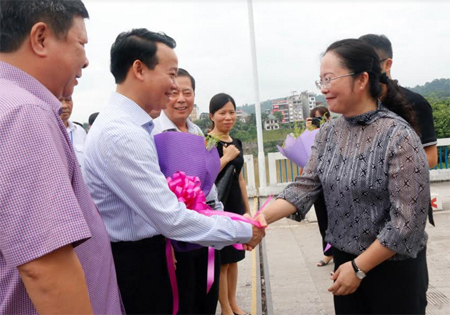On June 11, the Yen Bai delegation led by Mr. Do Duc Duy – Chairman of Yen Bai Provincial People’s Committee participated GMS Economic Corridor Forum of 2018" in Kunming City, Yunnan Province, China.

The leaders of Ha Khau district, Yunnan Province, China welcomed the delegation of Yen Bai province at Ha Khau border gate.
"The GMS Economic Forum Governor Forum 2018" with the participation of local government leaders from six countries in the Mekong Subregion Corridor (Cambodia, Laos, Myanmar, Thailand, Vietnam, China) aims to realize the deep-rooted consensus which reached at the 6th GMS Leaders' Meeting. The "The GMS Economic Forum 2018" will contribute to strengthening exchanges and exchanging policies between local authorities in GMS Economic Corridors and identify specific project-based co-operation in priority areas.
At the forum, Mr. Do Duc Duy – Chairman of Yen Bai PPC will have a speech to introduce about potentials, chances and investment policies in Yen Bai and two cooperation projects with localities in GMS Economic Corridors.
The investment project on building a cinnamon-intensive factory with a total investment of $ 30-35 million, an expected capacity of 10,000 tons of raw material cinnamon and more than 20,000 tons of products per year; The project on investing high quality vegetable and fruit in Yen Bai province with total estimated investment of 13 million USD, expected capacity of 20,000 tons /year, serving domestic demand and export.
The Greater Mekong sub-region is an area linked by the Mekong River, covering an area of 2.6 million km2 and a population of about 340 million.
The GMS was initiated in 1992 with the assistance of the Asian Development Bank (ADB), with members from Cambodia, Laos, Myanmar, Thailand, Vietnam and Yunnan, Guangxi province (China).
GMS cooperation is seen as a leading mechanism for effective cooperation in the GMS cooperation mechanisms to promote and facilitate for muatually economic development among countries. This will contribute to expand the Greater Mekong sub-region into a rapidly growing and prosperous region in Southeast Asia.
The GMS co-operation strategy is based on three pillars, including infrastructure connectivity, improving competitiveness and raising public awareness of addressing social and environmental issues.
2144 lượt xem
By Thanh Thuy